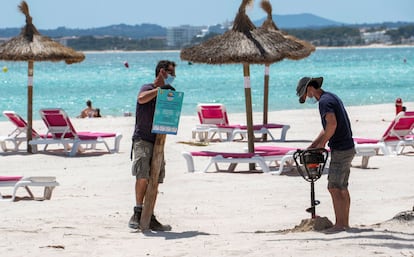Fears loom in Spanish tourism industry as restrictions in Britain, Germany threaten summer rebound
Visitors from both countries are key to the success of Spain’s high season and its economic recovery from the coronavirus crisis

The British government’s decision to leave Spain off its coronavirus “green list” of countries has sparked alarm bells in the Spanish tourism industry. The move means that British travelers returning from Spain must continue to provide a negative test on arrival, quarantine for 10 days and take two Covid-19 tests at home. There were hopes that at least the Balearic and Canary islands would enter the green list, given the regions’ low contagion rates, but these were dashed last Friday, when the British government announced its traffic light system for international travel and placed all of Spain in the “amber” category.
The Spanish industry, commerce and tourism minister, Reyes Maroto, has tried to ease concerns, insisting that Britons should be able to visit Spain from May 20 without a PCR test. But this is dependent upon the UK government removing the country – or at least regions with a better epidemiological situation – from the amber list.
The German government’s recommendation against non-essential travel has also raised alarm. Without the German and British markets, the success of the summer tourism season is at risk, and with it, Spain’s economic recovery from the coronavirus crisis.
In 2019, Spain received more than 18 million tourists from the UK and 11 million visitors from Germany
The Spanish tourism industry relies heavily on the millions of British and German visitors who arrive each year. In 2019, before the pandemic, Spain received more than 18 million tourists from the UK and 11 million visitors from Germany. But the dependency on these two large markets is now a source of concern. On the one hand, the UK government has left Spain off its green list, and on the other, Germany has maintained its recommendation against non-essential travel. To complicate the situation further, the images of disorderly street parties across Spain following the end of the state of alarm have done little to boost confidence.
Without British and German tourists it will be impossible for the tourism industry to bounce back properly and this could delay Spain’s economic recovery from the coronavirus crisis. In 2019, tourists from these countries accounted for more than one-third of all visitors to Spain, and consequently, most of tourist spending. What’s more, half of tourism gross domestic product (GDP) is decided in the summer high season, between June and September.
José Luis Zoreda, the vice-president of the tourism lobby Exceltur, is hopeful the British government will move Spain to the green list. But if this does not happen, he warned, the consequences could be catastrophic. “Right now the only thing that is saving us is the fact that of our competitors, only Portugal is on the green list,” he said. “Not having UK visitors in May and June could mean a loss of nearly €3 billion compared to 2019 figures. And that’s not counting July and August. If we remain [on the green list] then, the season will be lost.”
The Spanish government, which a coalition of the Socialist Party (PSOE) and junior partner Unidas Podemos, is trying to boost optimism. To lessen the blow of the UK’s decision, Maroto has been insisting that the UK government will revise its decision to leave Spain off the green list in the next review, but this is more of a hope than a guarantee.
Not having UK visitors in May and June could mean a loss of nearly €3 billion compared to 2019 figuresJosé Luis Zoreda, vice-president of the tourism lobby Exceltur
Speaking on Wednesday, she explained: “The list is updated regularly to adapt to the epidemiological situation in each country.” The following day, at the opening of the Fitur tourism fair, she added: “We have asked [the UK government] to differentiate between territories and allow travel to at least the areas of Spain with a low incidence rate. But it will be up to the UK to decide.” If Britain does not agree to do this, Spain will have to make more of an effort to lower its incidence rate, she said.
But the state secretary for tourism, Fernando Valdés, has said that it will be difficult for the UK to assess Spain on a region-by-region basis. “I have the feeling that this is complicated because it would have to do it for everyone, not just for us,” he explained on Tuesday. Despite this, he is confident that British tourists will be able to travel to Spain in summer without restrictions.
Given the importance of the summer season to Spain’s economic recovery, the government is pressuring the European Union to approve the “Digital Green Certificate” as soon as possible. This document – which indicates whether the bearer has been vaccinated, has tested negative for the coronavirus or has recently had the virus – will allow citizens of Europe to enter Spain without having to quarantine or take a coronavirus test.
Pilot program
Maroto said on Thursday that Spain will carry out a pilot program with 10 destinations starting next week. She also added that restrictions on non-essential travel for visitors from outside of the EU will also be relaxed. From Thursday, Spain wants to allow tourists from countries with a low incidence rate to visit without a PCR test – even if they have not been vaccinated. This move could benefit visitors from the UK, the United States and some countries in Latin America and Asia. These conditions would also apply to countries with a low incidence rate within Europe, meaning a traveler would only need to be vaccinated if they are coming from an area where the contagion rate is above the risk threshold.
But Zoreda, from Exceltur, is still concerned: “What’s important is that tourists are not punished when they return to their countries. If the United Kingdom maintains restrictions, [the Digital Green Certificate] will be worthless.”
English version by Melissa Kitson.
Tu suscripción se está usando en otro dispositivo
¿Quieres añadir otro usuario a tu suscripción?
Si continúas leyendo en este dispositivo, no se podrá leer en el otro.
FlechaTu suscripción se está usando en otro dispositivo y solo puedes acceder a EL PAÍS desde un dispositivo a la vez.
Si quieres compartir tu cuenta, cambia tu suscripción a la modalidad Premium, así podrás añadir otro usuario. Cada uno accederá con su propia cuenta de email, lo que os permitirá personalizar vuestra experiencia en EL PAÍS.
¿Tienes una suscripción de empresa? Accede aquí para contratar más cuentas.
En el caso de no saber quién está usando tu cuenta, te recomendamos cambiar tu contraseña aquí.
Si decides continuar compartiendo tu cuenta, este mensaje se mostrará en tu dispositivo y en el de la otra persona que está usando tu cuenta de forma indefinida, afectando a tu experiencia de lectura. Puedes consultar aquí los términos y condiciones de la suscripción digital.









































